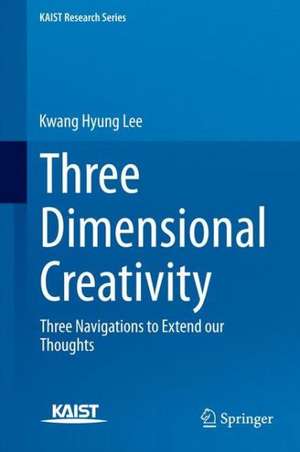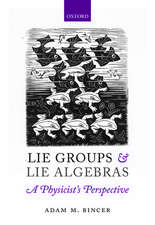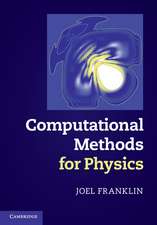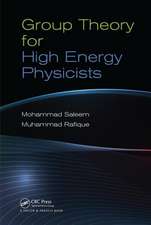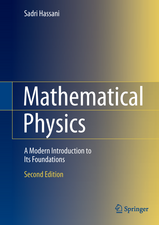Three Dimensional Creativity: Three Navigations to Extend our Thoughts: KAIST Research Series
Autor Kwang Hyung Leeen Limba Engleză Hardback – 14 mai 2014
The three questions suggested here are given on the three axes: time, space, and field, and this book deals with theoretical and practical aspects on the topics. In this way it is a unique book about the systematic method of developing creativity, which will have appeal to researchers and students in multidisciplinary fields from neuroscience to physics, and engineering and computer science, as well as a general public.
| Toate formatele și edițiile | Preț | Express |
|---|---|---|
| Paperback (1) | 376.80 lei 43-57 zile | |
| SPRINGER NETHERLANDS – 3 sep 2016 | 376.80 lei 43-57 zile | |
| Hardback (1) | 384.09 lei 43-57 zile | |
| SPRINGER NETHERLANDS – 14 mai 2014 | 384.09 lei 43-57 zile |
Preț: 384.09 lei
Nou
Puncte Express: 576
Preț estimativ în valută:
73.50€ • 76.27$ • 61.44£
73.50€ • 76.27$ • 61.44£
Carte tipărită la comandă
Livrare economică 17-31 martie
Preluare comenzi: 021 569.72.76
Specificații
ISBN-13: 9789401788038
ISBN-10: 9401788030
Pagini: 200
Ilustrații: X, 87 p. 94 illus.
Dimensiuni: 155 x 235 x 15 mm
Greutate: 0.32 kg
Ediția:2014
Editura: SPRINGER NETHERLANDS
Colecția Springer
Seria KAIST Research Series
Locul publicării:Dordrecht, Netherlands
ISBN-10: 9401788030
Pagini: 200
Ilustrații: X, 87 p. 94 illus.
Dimensiuni: 155 x 235 x 15 mm
Greutate: 0.32 kg
Ediția:2014
Editura: SPRINGER NETHERLANDS
Colecția Springer
Seria KAIST Research Series
Locul publicării:Dordrecht, Netherlands
Public țintă
ResearchCuprins
Preface.- 1 Creativity can be cultivated.- 2 Freedom from time.- 3 Freedom from space.- 4 Freedom from field.- 5 Traveling on a two-dimensional plane.- 6 Traveling in a three-dimensional world.
Notă biografică
Prof. Kwang-Hyung LEE is a professor at department of Bio and Brain Engineering, and head of graduate school of Future Strategy of KAIST(Korea Advanced Institute of Science and Technology). His interests include Intelligence, Bioinformatics, Creativity and Future strategy. He published more than 100 research papers, and received a merit medal "Chevalier" from French government.
He wrote many books such as: Introduction to systems programming(Prentice Hall), First course on fuzzy theory and applications(Springer), C programming(Hongreung, in Korean), Fuzzy Theory(Hongreung, in Korean), and Three dimensional creativity(Bizmap, in Korean).
He wrote many books such as: Introduction to systems programming(Prentice Hall), First course on fuzzy theory and applications(Springer), C programming(Hongreung, in Korean), Fuzzy Theory(Hongreung, in Korean), and Three dimensional creativity(Bizmap, in Korean).
Textul de pe ultima copertă
Is creativity something that we are simply born with and cannot hone with effort? Some say that creativity cannot be cultivated. Is it true? In general, our thinking sticks to reality unless there is any external stimulation. With our thinking fixed on a certain situation, it becomes difficult to come up with a fresh idea. In this regard, three questions are suggested: (1) Question of Time: When a problem arises, question yourself on a time axis first of all. How would the matter be handled 10 or 20 years from now? (2) Question of Space: Ask yourself some questions on its spatial elements. How would the matter be handled in Saudi Arabia or in China? (3) Question of Field: Apply the given problem in a variety of fields. How would the matter be handled in the field of music or electronic engineering?
The three questions suggested here are given on the three axes: time, space, and field, and this book deals with theoretical and practical aspects on the topics. In this way it is a unique book about the systematic method of developing creativity, which will have appeal to researchers and students in multidisciplinary fields from neuroscience to physics, and engineering and computer science, as well as a general public.
The three questions suggested here are given on the three axes: time, space, and field, and this book deals with theoretical and practical aspects on the topics. In this way it is a unique book about the systematic method of developing creativity, which will have appeal to researchers and students in multidisciplinary fields from neuroscience to physics, and engineering and computer science, as well as a general public.
Caracteristici
Presents a unique text about the systematic method of developing creativity Multidisciplinary appeal; of interest and use to researchers and students in neuroscience, education of creativity and leadership and artificial intelligence Unique combination between theory and creativity Includes supplementary material: sn.pub/extras
